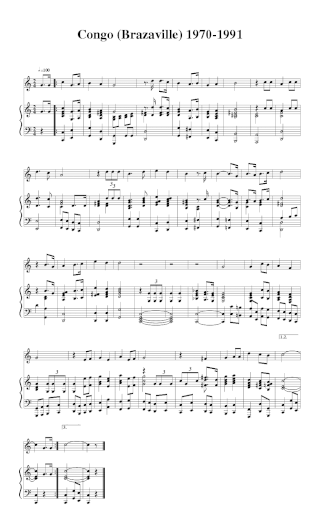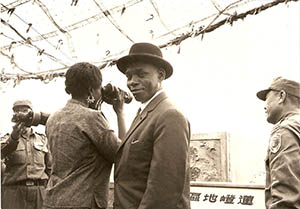
The history of the Republic of the Congo has been marked by diverse civilisations: Indigenous, French and post-independence.

AbbéFulbert Youlou was a laicized Brazzaville-Congolese Roman Catholic priest, nationalist leader and politician, who became the first President of the Republic of the Congo on its independence.
André Grenard Matswa was a Congolese Lari anti-colonial activist born near Manzakala-Kinkala in then Middle Congo, a rare influential figure in Congolese politics before independence in 1960. He inspired a messianic cult, Matswanism or Matsouanism, that emerged in the French Equatorial African capital, Brazzaville.

Alphonse Massamba-Débat was a political figure of the Republic of the Congo who led the country from 1963 until 1968 in a one-party system.

"Les Trois Glorieuses" was the anthem of the People's Republic of the Congo from January 1, 1970, through 1991, when the original anthem, "La Congolaise", was restored.
Stéphane Maurice Bongho-Nouarra was a Congolese politician. He served in the government of Congo-Brazzaville during the late 1960s, and after a long period in exile, he returned and played an important role in the politics of the 1990s. Bongho-Nouarra was briefly Prime Minister of Congo-Brazzaville from September 1992 to December 1992.
Ambroise Édouard Noumazalaye was a Congolese politician who was Prime Minister of Congo-Brazzaville from 1966 to 1968, under President Alphonse Massamba-Débat. Later in life he served as Secretary-General of the Congolese Labour Party (PCT) and was a supporter of President Denis Sassou Nguesso. He served as President of the Senate from 2002 to 2007.
Bernard Bakana Kolélas was a Congolese politician and President of the Congolese Movement for Democracy and Integral Development (MCDDI). Kolélas was a long-time opponent of the single-party rule of the Congolese Labour Party (PCT), and after the introduction of multiparty politics in the early 1990s he was one of Congo-Brazzaville's most important political leaders. He placed second in the August 1992 presidential election, behind Pascal Lissouba; subsequently he was mayor of Brazzaville, the capital, during the mid-1990s, and he briefly served as Prime Minister of Congo-Brazzaville during the 1997 civil war. After rebel forces prevailed in the civil war, he lived in exile for eight years until an amnesty made it possible for him to return; he was then elected to the National Assembly in 2007.
Claude-Ernest Ndalla is a Congolese politician. First coming to prominence as a radical youth leader in 1960s Congo-Brazzaville, he was one of the leading members of the Congolese Labour Party (PCT) in the period immediately following its founding in 1969, but after a few years his career fell into a long decline due to factional struggles within the PCT. Later, he served in the government of Congo-Brazzaville as Minister of Youth Redeployment and Sports from 1997 to 1999, and he has been a Special Adviser to President Denis Sassou Nguesso since 2003.
The Congolese Youth Union was a youth organization in Congo-Brazzaville. The U.J.C. was initially merely a local branch of the Republican Youth Union of France (U.J.R.F.), the youth wing the French Communist Party. However it developed into an independent organization and began organizing cells in different parts of the territory. The movement established a sizeable presence in the cities of lower Congo, such as Point-Noire, Jacob and Dolisie. U.J.C. was led by the trade union leader Aimé Matsika.
The Congolese Progressive Party was a political party in Congo-Brazzaville. It was the first Congolese political party, and the Congolese section of the African Democratic Rally (RDA). Until 1950 PPC was closely connected to the French Communist Party. The party was largely based amongst the Vili people. Aubert-Lucien Lounda was the General Secretary of the party.

The National Movement of the Revolution was a political party in the Republic of the Congo. MNR was founded at a congress held June 29 to July 6, 1964. MNR was instituted as the sole legal political party in the country on July 20, 1964, according to the Law No. 25-65. Pre-existing political parties were ordered to fuse into the MNR. MNR adopted scientific socialism as its ideological foundation. Ambroise Noumazalaye was the First Secretary of the party.

M 22 was a political movement in Congo-Brazzaville. It was active in 1972 and 73 before its guerrilla base was compromised and most of its cadre arrested including its leader Ange Diawara.

Emmanuel J. Damongo-Dadet was the first Congolese ambassador to the United States and the United Nations. He was born in Impfondo, at the time Congo was the Middle Congo, a colony that was ruled by France. In his early days, he was taught at Brazzaville and went on to become a teacher and director of École Urbaine at Dolisie. A renowned journalist, poet and novelist in his native country, he wrote Congolila, published in 1950, and Panorama Congolais in 1962.

Municipal elections were held for the first time in Moyen-Congo on 18 November 1956. Voting took place in three municipalities; Brazzaville, Pointe-Noire and Dolisie. The Democratic Union for the Defence of African Interests won the polls in all three municipalities. Fulbert Youlou became mayor of Brazzaville.
Albert Fourvelle was a Congolese politician. Fourvelle was of mixed African-European heritage. He worked as a trader, and became an active socialist. In 1952 he was elected to the Territorial Assembly.
Between June 5 and 6, 1963, the Guinean president Sékou Touré made an official visit to Brazzaville, the capital of the Republic of the Congo. He was received by the Congolese president Fulbert Youlou. The visit sparked protests against the Congolese government, marking a beginning to the popular movement that would end Youlou's rule two months later.
Léon Robert Angor was a Congolese politician and trade union leader. He was a leader of the CASL trade union centre. He was the President of the National Assembly of the Republic of the Congo between 1964 and 1966. Angor was identified as part of the pro-China wing of the ruling National Movement of the Revolution. Under Angor's aegis, the Congolese Trade Union Confederation was formed in March 1964.
François Luc Macosso was a Congolese politician.
Alice Badiangana also Alice Badiangaba or Alice Mbadiangana, later Alice Mahoungou is a trade unionist and politician from the Republic of the Congo. She was the first Congolese woman to be held as a political prisoner, and was s co-founder of the Congolese Youth Union and a leader of the African Women's Union of the Congo.







